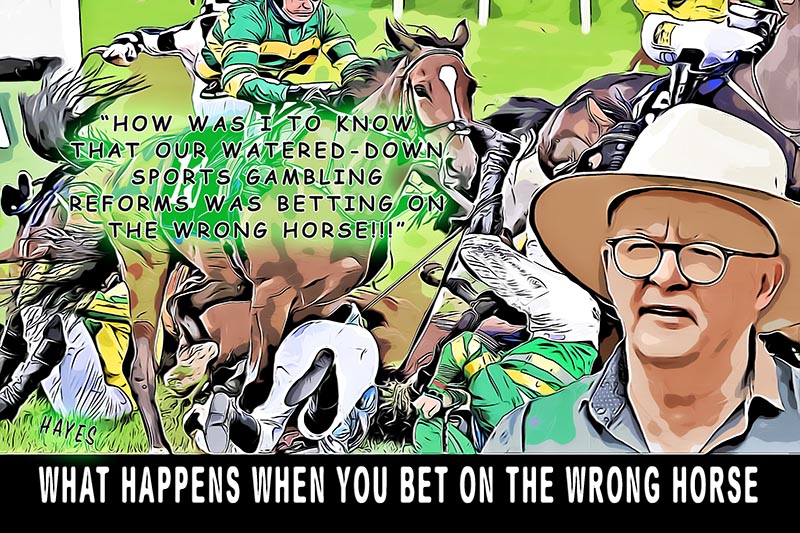

Betting on the wrong horse
It’s undeniable that sport’s gambling advertisements continue to pop up on our television screens and on our electronic devices, making gambling look exciting and risk-free. But, according to a recent survey, 81 per cent of the population agree that gambling advertisements should be banned in sport. So, why is the Federal Government only proposing a cap on television advertising instead of a total ban?

14 August 2024
ALAN HAYES
GAMBLING is addictive and harms millions of Australians, and gambling advertisements are often placed when and where children and teenagers will see them the most. Australians should be able to enjoy their favourite sports on television, gambling-ad-free. But it seems Australia’s TV networks will continue to access hundreds of millions in revenue from gambling companies for the foreseeable future.
Despite Prime Minister Anthony Albanese ‘puffing out his chest’ and declaring that his government was tackling the problem head-on, he has now come under fire from furious Crossbenchers for kowtowing to the electronic media.
FreeTV Austrailia squealed like ‘stuck pigs’ at the thought of loosing their lucrative gambling advertising revenue and called for it to be “offset by reductions in the regulatory burdens on commercial broadcasters”.
The ‘hollow’ cry of the broadcasters had nothing to do with what was right and to eliminate TV gambling advertisements entirely, but was all about ‘woe is me’ – what about our lucrative income stream?
The cries of ‘foul’ by the broadcasters and the Federal Governments proposed new laws have been variously reported in the media, with many news’ platforms now refusing to accept sports-betting advertisements. But what is the governments real intention? To introduce a ‘watered down’ solution that will do absolutely nothing to remove sports gambling advertisements from TV and other media outlets?
When questioned by the print media about the proposed new sports gambling laws, the prime Minister did a side step, a small shuffle and with his ‘true to form’ wily grin said, “Don’t believe everything you read in the paper.”
“We’ll announce what our preferred solution is when we announce it,” he said.
The preferred solution, it would seem, is to not come down hard on sports gambling revenue being enjoyed by the exclusive members of ‘The Fourth Estate’.
Labor’s reported announcement that they will introduce a blanket ban across social media and a cap on TV advertising - a maximum of two gambling advertisements per hour on each channel until 10pm, and no advertisements for an hour before and after live matches – just doesn’t cut the mustard.
So, why aren’t laws prohibiting sports gambling advertising being banned altogether? Is it because of the benefits being enjoyed by many of our politicians? The ones that are supposed to care about their constituents, as well as the overall plight of families suffering because of a gambling addiction!
We know the harms that gambling causes - at an individual, family, and societal level – including impacts on finances, relationships, and health and wellbeing. Research shows that exposure to sports gambling advertising is leading to riskier betting behaviour and escalating the likelihood of individuals, and their families, experiencing gambling harms.
Yet despite the majority of voters agreeing that gambling advertisements should be banned in sport, our so-called caring politicians are more interested in pandering to the financial wants of the media giants – shovelling obscene amounts of gold into their coffers.
An analysis of Parliament’s interests registers has revealed that major party politicians have accepted at least 299 gifts, including tickets to sporting events and shows, from the gambling industry in the past five years. But it doesn’t stop there: forty-eight current federal politicians have declared gambling largesse since the May 2019 election. That’s 21% of all federal politicians, MPs, senators and their families have enjoyed free entry and hospitality to AFL and NRL grand finals and to the Melbourne Cup as part of their bounty, while a dozen others own shares in gambling companies. In fact, the MP who has received the second highest number of gifts is Communications Minister Michelle Rowland, who is responsible for regulating online gambling and gambling advertisements.
So, while the Albanese Government has ducked a fight with Australia's media over gambling advertising, it seems that the TV networks will continue to enjoy hundreds of millions in revenue from gambling companies, with little, if any conscience to the harm it will be causing.
What about the human cost?
People want to enjoy watching sport without having to being continually bombarded by inducements to bet. Research shows that the majority of TV viewers support restrictions on sports gambling advertising by not having it appear at all on their screens.
Parents don’t want their children talking about the odds and the bookmakers more than the game or the players.
Research by the Australian Institute of Health and Welfare (AIHW) found that almost half (46%) of Australians aged 18 and over, who gambled, would be classified as being at-risk of, or already experiencing, gambling harm.
But the real social costs of gambling are crime, loss of business productivity, bankruptcy, suicide, illness related to pathological gambling, social service costs, direct regulatory costs and family costs. Gambling-related harm affects not only the people directly involved, but also their families, peers and the wider community.
Estimates also suggest that Australians lose approximately $25 billion on legal forms of gambling each year, representing the largest per capita losses in the world.
And how much does the Australian Government earn each year from legalised gambling? Approximately $5.8 billion – a powerful reason not to upset the status quo.
The online dilemma
The harms of addiction are well documented, so how effective will the government’s proposed new laws be in quelling the explosion of online gambling advertisements be?
With so much attention on the government’s plans to limit, rather than ban, television gambling advertisements, less scrutiny has been applied to its plan to restrict advertising online.
Regulating the digital space could prove difficult, given the world of 'dark' promotion that feeds the gambling industry, ranging from influencer endorsements to social media memes.
It’s time for a government ‘reality check’ – there’s a whole shadowy world of online promotion that will be difficult or impossible to stop.
Gambling advertisements are out of control
Most Australians say they hate gambling advertisements on TV and that they’re sick and tired of the proliferation of these advertisements, especially in the early part of the evening when young children and teenagers would be viewing a programme.
Yet despite this proliferation, the electronic media and the gambling companies contend that they are doing whatever is necessary to protect vulnerable viewers.
Professor Samantha Thomas, a public health and gambling expert at Deakin University, was reported as saying that it was “unacceptable that big gambling companies and broadcasters appear to be calling the shots” on protecting communities from gambling harm.
“The proposed reforms do not appear to be based on public health evidence, and the clear recommendations from experts that were provided to the [Murphy] inquiry,” Thomas said.
Although Labor’s plan could reportedly ban betting ads on social media and other digital platforms, Thomas said advertisements on television would still be a major problem.
“Public health experts and community organisations and children themselves have been very clear about the need for a complete ban on gambling advertising,” she said.
“The only groups that gambling marketing benefits are those that profit from it.”
The independent MP Kate Chaney, a committee member of the Murphy inquiry, told Radio National it “does seem” more consultations had taken place with companies “likely to lose out if there is a ban on gambling ads” and “not quite as much … on the other side, [with] all the people experiencing problems with gambling or who are sick of seeing ads wherever they look”.
“Partial bans don’t work, they simply move ads from one place to the other,” she said.
The fact is that the primary goal of gambling advertisements is to get people to gamble more, or start gambling – it just that simple.
Gambling advertisements make gambling look glamorous and winning appear achievable. Sports-betting advertisements make the gambler look cool and admired in front of their friends. So, the prominence of these advertisements in the media will continue to be an issue for many reasons, including the fact that they target people who are most vulnerable to gambling advertisements. For example, people who show interest in gambling-related topics, such as television sports, are more likely to be targeted with advertisements about sports betting.
Studies have also shown that people with gambling problems report more exposure and impact from gambling advertising. Once a player places a bet online, betting companies collect the player’s activity data, and tailor their offers to the specific player.
Although most gambling advertisements are created with the intention of targeting adults, these advertisements often end up appealing more to children and teenagers, who are more likely to develop a problematic relationship with gambling.
The parliamentary inquiry into online gambling harm, set up by the government, heard powerful evidence of online gambling harm, including harrowing testimony from gamblers for whom advertising made their attempts to quit far more difficult. Yet it would seem that this testimony, and known research into the harmful social impact of gambling advertising, continues to fall on death ears
Gambling has become so normalised in our society that kids, who are exposed to it at a very young age, grow up thinking that gambling is a harmless activity.
All this is compounded because there is heavy competition in the gambling industry. Just like any other industry, the gambling companies will do whatever it takes to keep their business afloat – with the help of the Albanese Government, who is prepared, it would seem, to throw them a lifeline.
But if, as reported, the Albanese Government continues to allow sports gambling advertisements, will it have been a ‘bet on the wrong horse’, with the Labor Party failing to cross the finish line at the upcoming election?








.jpg?crc=4257584689)










_web.jpg?crc=282450513)



